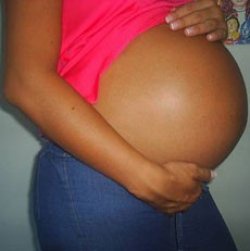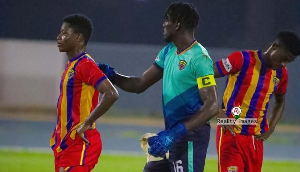While conditions in the country’s prisons continue to deteriorate due to lack of funds, congestion and the spread of diseases, vulnerable persons such as pregnant women, nursing mothers and babies are still being thrown into jail.
The latest annual report (2011) by the Ghana Prisons Service indicated that there were 14 pregnant women, six nursing mothers and six babies in four of the nation’s prisons, namely Nsawam, Kumasi, Sekondi and Sunyani. All 14 pregnant women took seed before they were locked up.
There were four pregnant women at Nsawam, Kumasi - seven; Sekondi - two, and Sunyani - one. For the nursing mothers, two were in Nsawam, Kumasi - three, and Sunyani - one, but there was none in the Sekondi prison.
The distribution of babies in the prisons were as follows; Nsawam – two, Kumasi – three, Sunyani – one, with none in the Sekondi prison.
According to the Chief Public Relations Officer of the Ghana Prisons Service, Deputy Superintendent of Prisons (DSP) Vitalis Aiyeh, the current situation will not change so long as the suspended sentencing, parole and community service schemes do not exist in Ghana’s criminal justice system.
He told The Mirror in an interview that fines imposed on convicts, including pregnant women and nursing mothers might sometimes be so huge that they were unable to pay and were thus compelled to serve custodial sentences.
A suspended sentence is a legal term for a judge's delaying of defendants’ serving of sentences after they have been found guilty, in order to allow them to perform a period of probation. If the defendant does not break the law during that period, and fulfills the particular conditions of the probation, the judge usually throws out the sentence.
Parole is the provisional release of a prisoner who agrees to certain conditions prior to the completion of the maximum sentence period. Originating from the French word, parole ("voice", "spoken words"), the term was used during the middle ages with the release of prisoners, “Who gave their word” to be of good behaviour.
This differs from amnesty or commutation of sentence, in that parolees are still considered to be serving their sentences, and may be returned to prison if they violate the conditions of their parole. A specific type of parole is medical parole or compassionate release, which is the release of prisoners on medical or humanitarian grounds.
Community service is an activity that is performed by someone or a group of people for the benefit of the public or its institutions. Courts may demand it in lieu of, or in addition to, other criminal justice sanctions.
If these existed in Ghana’s laws, they could have offered the pregnant women and nursing mothers some reprieve to enable them to carry their pregnancy and/or raise their children in a more conducive atmosphere at home.
However, DSP Aiyeh says once a court of competent jurisdiction issues a warrant for a convict to be incarcerated, “The Prisons Service cannot turn them away even if they are pregnant or nursing mothers. If we do not take them in, we will be in contempt of court,” he said and suggested that civil society, Parliament and other interested groups could initiate discussions that might lead to a review of the laws.
He said the female prisons were not as congested as the male jails, for which reason inmates who are pregnant or nursing mothers are not exposed to any serious harm. “We also have baby care centres in the prisons to take care of the children that are brought into jail by their mothers”.
Meanwhile, tuberculosis, HIV/AIDS and malaria still remain the leading causes of death among prisoners. According to the 2011 prisons report, tuberculosis claimed 11 lives, HIV/AIDS – 10, while five inmates fell to malaria. Other major killers were anaemia, respiratory disorder, pneumonia, liver disease and chest infection.
General News of Saturday, 5 October 2013
Source: The Mirror
14 Pregnant women in jail

















